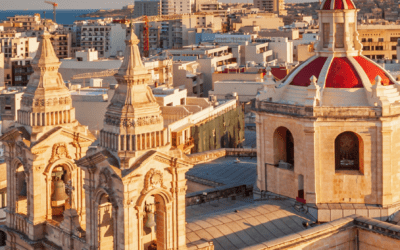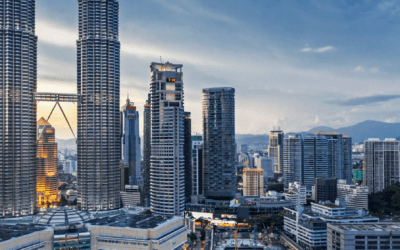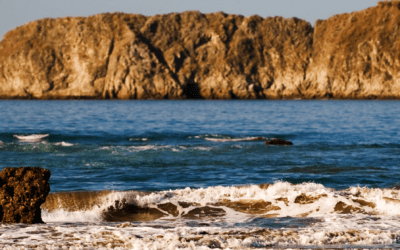Last Updated May 18, 2022
Disclaimer: After the Malaysian government suspended the MM2H program suddenly in July 2020, Malaysia’s Home Ministry Secretary-General reopened the program in October 2021.
This is because Malaysia’s luxury real estate industry relies heavily on foreign investors.
Changes to the program included the minimum monthly income required being raised from RM10,000 a month to RM40,000 ($9,100) Another major increase is the required Fixed Deposit to RM1 million ($227,505).
As a melting pot of cultures, Malaysia’s allure lies both in its bustling streets and its stunning skylines. This Asian peninsula was once home to the tallest buildings in the world, the Petronas Twin Towers. While they no longer hold that record, they remain a monument to Malaysian forward-thinking. Signs of Malaysian innovation don’t stop there. All you have to do is visit some of the country’s bigger cities to experience its contemporary way of life.
Andrew will tell you himself that Kuala Lumpur is one of his favorite Asian cities. As one of his chosen bases around the world, Andrew spends a lot of his time there. With the Malaysia My Second Home (MM2H) visa, he benefits from the lifestyle that Malaysia offers to digital nomads. Not only did Andrew get his MM2H by himself, but he has helped other people to do so as well through the holistic planning services that Nomad Capitalist offers.
Whether you’re the outdoorsy type or more of a city slicker, Malaysia has something for expats of every kind. Beyond being a jewel of Southeast Asia, Malaysia has a reputation for being very tax-friendly. This makes it especially attractive to entrepreneurs and business people looking to keep more of the money they earn. With relatively relaxed tax laws, Malaysia is a great place for nomads looking to maintain their offshore income.
As the country continues to develop, it becomes an increasingly more attractive destination for expats. The Malaysian government has made it easy for foreigners to do business, invest, and live in their country. Fortunately for you, turning this Southeast Asian gem into your second home is a pretty straightforward process, thanks to the MM2H program.
There are a few other ways to live in Malaysia long-term, such as the Labuan work permit or a simple travel visa, each with its own advantages and disadvantages, but nomads are best served by the MM2H. This article will give you an in-depth look at this particular visa.
The Malaysia My Second Home program is a great fit for expats frustrated by the large amounts of money expected from other second residence programs that often demand that you actively manage a local business. At the same time, the program isn’t ideal for entrepreneurs who are just starting their careers. This visa program demands that you have funds (approximately $120,000 in liquid assets and $72,000 to invest) and time to spare while completing the process.
Why Malaysia?
Malaysia isn’t just a beautiful country, but it also grants significant economic benefits ranging from its open economy to its rather relaxed property ownership laws.
The benefits that Malaysia provides make it a great alternative to Singapore, even while its proximity to Singapore provides certain advantages. That said, Singapore boasts the second freest economy in the world, and probably the most accessible economy for Westerners in terms of investment.
However, while Singapore has a reputation for being the ideal place to go offshore, it demands a significant amount of cash. If you have a million dollars to burn, you might be keen to invest in some real estate in Lion City. Nonetheless, most other foreign investors can expect to hit a wall when buying real estate in Singapore.
Also, the restrictions on foreign real estate investment in Singapore detract from the country’s economic grandeur. Annual property taxes coupled with stamp taxes mean that expats investing in Singapore can expect less bang for their buck. Foreigners must also pay a rental income tax of 20%, which puts them at a great disadvantage compared to Singaporean residents looking to invest.
Malaysia, on the other hand, has fewer ownership restrictions. Your investment is likely to go much further there. As long as the property is worth at least one million Malaysian ringgit (MR) ($240,000), it’s fair game for foreigners. However, in areas like Selangor or Johor, the threshold can be closer to about 2 million MR ($480,240).
Before you decide to get a Malaysian residence permit, you should first visit the country on a tourist visa to decide whether or not you want to live there.
There is a long list of passports that offer visa-free entry to Malaysia:
- a 90-day visa is granted to citizens of the United States (US), Canada, and the European Union (EU)
- a 30-day visa is granted to most Europeans (non-EU), South Americans, Africans, and Asians
Citizens from countries that do not have visa-free travel must apply for a visa. To find out if your country needs a visa, see this list.
If you come from a visa-exempt country, all you need is a passport that is valid for at least six months following your date of entry. Visitors using a travel visa must be able to show that they have a return ticket or a ticket to another country — often known as proof of onward travel — since immigration officials want to confirm that you won’t be overstaying your welcome.
How to Get a Malaysia My Second Home (MM2H) Visa
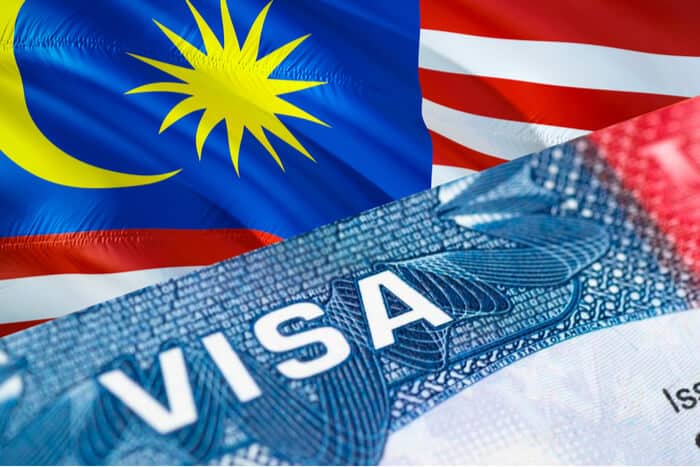
The MM2H program is the best way for expats to set down roots in Malaysia.
So if you want to live in Malaysia long-term, you can apply to the Malaysia My Second Home program. The MM2H program has basic financial requirements for liquid assets, a minimum offshore income, and a passive investment.
Occasionally, there are rumors that this program is going to go away. For instance, it was suspended back in 2018 and in 2020 (it remains suspended today; please see the disclaimer at the top of this article for more information).
As with most things in the world of second residencies, the targets are always moving. The program may change in the future, so we’ll do our best to keep this ultimate guide up to date with the latest information.
What has also long been rumored, and Andrew believes it is long overdue, is that they’re actually going to increase the cost of the program. But more on program costs in a minute.
Often referred to as MM2H, this program is similar to many retirement visa programs, but it is not restricted to retirees. This program can help all expats with the necessary means to acquire a residence permit in Malaysia for up to 10 years at a time.
Naturally, before applying, you should check your passport expiration date since your passport validity plays a role in determining how long your residence permit will be valid.
Additionally, while the MM2H is a great program, it is not equal to a Permanent Residence permit, and it will not lead to permanent residence either. MM2H is a Social Visit visa that allows for multiple entries and exits. This program allows you to live in Malaysia and bring your family along with you, as long as you can provide the right paperwork and financial standings.
One of the more significant upsides of the MM2H is access to the financial benefits Malaysia provides to new businesses or individuals looking to retire within its borders. Income tax is low, and the local business laws are very straightforward. This visa program can open doors for entrepreneurs and business people who are hoping to increase their financial gains by going offshore. As it is quite close to both Singapore and Hong Kong, Malaysia is also a great location for business travel.
Similar to the Labuan work permit, the MM2H program can help you bring your immediate family into the country. Parents or in-laws can also receive a yearly Malaysian visa. You can sponsor your worker maid and import your vehicle into the country, and even beloved pets can make their way to Malaysia with you on this visa. In essence, you can pick up and transport your life to Malaysia. It also helps that this program is more affordable than other second residence programs.
Qualifying for the MM2H Visa
The MM2H program is not restricted by age, gender, nationality, or religion. In the 17 years that the program has been in existence, Malaysia has approved over 40,000 visas from 130 different countries.
Most applicants come from Asian countries, followed by European countries and then the Americas. By far, the country with the highest approval rate is China, with Japan and Bangladesh in a close tie for second.
While anyone can apply for the MM2H visa, meeting the financial threshold is crucial to determine if you qualify. Applicants under the age of 50 must prove that they have a minimum of 500,000 MR ($120,000) in liquid assets and with a required fixed deposit or passive investment of 300,000 MR ($72,000). Applicants over 50 only need to prove that they have 350,000 MR ($84,000) in liquid assets and make a passive investment of 150,000 MR ($36,000).
In both cases, the money has to be placed in a Malaysian bank account. You’ll incur some fees when you make the transfer, but there are lots of banks for you to choose from where you can get your own personal banker. Depositing this amount will give you a priority relationship.
When you make the deposit, you have to convert that balance into ringgit because, after all, that’s why they want you there. The funds cannot be touched for at least one year. After the year, you can petition for the use of those funds for housing, medical insurance, or child tuition reasons.
This visa also requires you to provide a source of income; you should have a minimum monthly income of at least 40,000 MR ($9,513).
Program Costs & Fees
As far as fees go, you will need to pay a security bond and a personal bond at the duty stamp office. The security bond is only 10 MR ($2.40) and works as a safety deposit for your application. The personal bond is 2,000 MR ($480) and has to be paid for the visa to be issued. While these fees are nominal, you’ll have to ensure that they get paid for your application to go through.
Should you wish to enter the country while you are applying, you’ll need to get a Conditional Approval Letter. In this case, there are some added costs. This requires a one-time personal bond payment, and you are also liable to pay 90MR ($21) every year for the Social Pass under the MM2H.
While the MM2H is more affordable, it still requires a considerable amount of cash. 500,000 Malaysian ringgit (about $120,000) isn’t exactly peanuts. That’s also just the liquid assets you have to prove that you possess. Your passive investment, fees, and bonds will add up to even more than that.
Probably the biggest downside to this program is the fact that your passive investment has to be in Malaysian ringgit. Of course, it makes sense that the Malaysian government requires the funds to be in their currency. However, from an investment point of view, you can expect depreciation. Just last year, there was a significant dip in the currency. On the other hand, compared to other Southeast Asian countries, Malaysia has a much lower inflation rate.
Malaysian MM2H Application Process
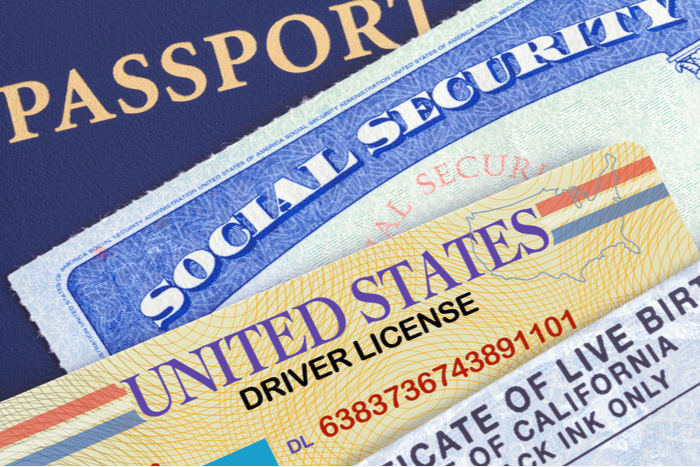
You can begin the application process for the MM2H before you ever arrive in Malaysia by gathering your documents and submitting many of them online.
You should begin by registering on the Check N Track system, which provides you with all the appropriate forms and helps manage all the paperwork for you. After you have signed up, you’ll need to decide if you want to do the application process by yourself or with the help of a licensed agent. One benefit of having an agent is that they can double as your sponsor. All MM2H applicants must have a Malaysian national sponsor, and the payment of your Personal Bond of 2,000 Malaysian ringgit ($480) must come from the sponsor.
There are plenty of agencies and packages available to assist you with the MM2H visa. Although they know their way around the Malaysian government and the visa application process, they are not lawyers. These agents are merely professionals approved by the Ministry of Tourism and Culture to help foreigners apply for the MM2H visa.
Different agents charge different fees. You can expect to pay about 8,000 MR – 10,000 MR ($1,900–$2,4000) for an agent. If you are familiar with the process and the Malaysian government offices, you can skip the agent and apply online directly. The online application or eVisa process only became available recently.
Once you or your agent have gotten all of your documents together, it’s time to submit your application. After your application has been approved, you’ll receive a Condition Approval Letter, which can take up to four or five months to arrive. Your Conditional Approval Letter or digital Electronic Visa Approval Letter (eVAL) will allow you to travel to Malaysia legally. You then have six months to follow up with any missing documents.
For Philippine applicants, the approval letter should be from the Philippine Overseas Employment Administration.
In 2018, the Immigration Department of Malaysia introduced electronic letters for approved MM2H applicants. They hoped to simplify the application process for foreign nationals. The eVAL makes it easier for applicants to obtain their visas.
Furthermore, this online service has an application monitoring program, which allows applicants to receive notifications about missing documents. With rising application numbers, this online service was the government’s solution to help reduce and locally delegate some of the work.
Follow-Up Paperwork
Once you arrive in Malaysia, the first thing you ought to do is set up your fixed deposit account. Once you have that done, you need to submit a Fixed Deposit Certificate to the MM2H Center.
Aside from setting up your bank account and depositing your Malaysian ringgit, you’ll need to consider medical coverage. The Malaysian government requires that both you and your dependents have health insurance. You are allowed to purchase any coverage, as long as it is valid in Malaysia. After you have done that, you’ll need to submit the appropriate documentation to the MM2H Center.
You will need to have your medical examination done when you first arrive in the country as well, for both yourself and your dependents. This examination can happen at any registered clinic or private hospital in the country. The Medical Report that the practitioner provides to you must also be submitted to the MM2H Center.
In terms of education, dependents planning to attend a school in Malaysia will need a Student Pass. In order to get this pass, the dependent needs to complete a Student Personal Data Form. Both this form and the application for the pass have to be submitted to the MM2H Center.
Getting Your Visa
When you have successfully submitted all the remaining documents, you can get your official MM2H program at the Immigration Center. Remember that this visa is valid for a maximum of 10 years. You will now have a Social Pass and can enter and exit Malaysia as you wish. Extending this visa is simple if you have the appropriate documents and capital available.
Withdrawing from Your Fixed Deposit Account
After a year, if you decide to make a withdrawal from that bank account, some documents are necessary. Only approved expenses related to Children’s education in Malaysia and medical purposes are allowed, or any other approved expenses relating to a purchase of a house, car purchase (to submit car grant title and receipt)
Second, there are limits to how much you can withdraw. MM2H visa holders under 50 must maintain 150,000 MR ($36,000) in their Fixed Deposit bank accounts. Those over 50 only have to maintain 50,000 MR ($12,000) in the account.
To legally make this withdrawal, you need the following documents:
- Your Malaysia MM2H visa (copy)
- A Letter of Intention to Withdraw from your Fixed Deposit account
- The front page of your passport (copy)
- Your Fixed Deposit Certificate (copy)
- Your Conditional Approval Letter (copy)
You will also need to provide a copy of the proof of payment for your residential property purchase (i.e., the complete Sales & Purchase agreement and a receipt). If you are using the funds for tuition, then you’ll need a copy of the proof of payment for the child’s education in Malaysia. Should the funds be for medical care, you must submit a copy of the proof of payment for medical expenses.
Two years down the road, you will be able to make withdrawals for your vehicle. You’ll need the same documentation mentioned above and the purchase grant of your car. However, the minimum for your Fixed Deposit account remains the same — $36,000 for those under 50 and $12,000 for those over 50. That amount should remain for the rest of your stay on the visa.
Should I Consider an MM2H Visa?
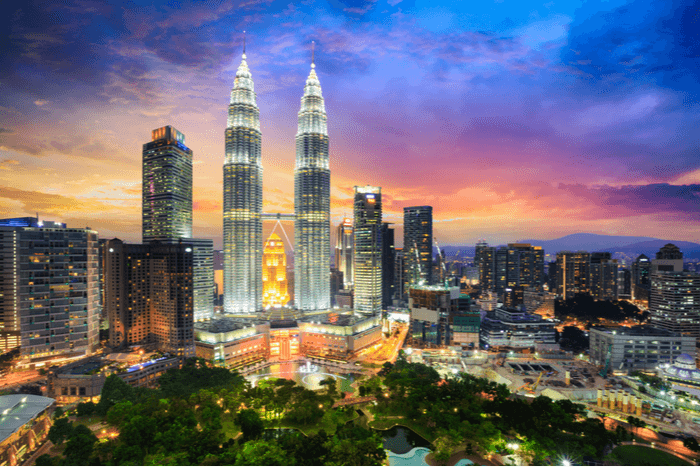
Malaysia has long been the hidden gem of Southeast Asia and is one of Andrew’s favorite bases.
Whether you are considering the MM2H visa because of the lifestyle benefits for you and your family, or you are looking to start an offshore business with low-income tax rates, Malaysia offers many benefits.
Retiring in Malaysia is especially tempting as well, as offshore pensions are exempt from tax.
Malaysia is an incredibly diverse and captivating country. Nomads looking to make it their second home won’t be disappointed by the lifestyle it offers. The Malaysian government has a history of innovation and looking toward the future. Malaysia’s capital already meets the standards of a developed country, and the government is committed to becoming a fully developed country by 2030. In Andrew’s opinion, you can already enjoy the same quality of life in Kuala Lumpur as in some countries in the EU.
However, before you head east, it’s vital to learn more about Malaysian culture — especially when it comes to business practices. Business norms can be very different in Asia than in the West, so you should be prepared for a bit of professional culture shock.
Additionally, while Malaysia is highly multicultural, it is still a predominantly Muslim country, which means that Malaysian society is much more conservative than the US, Europe, and even some of its neighbors. While this conservatism is less pronounced in larger cities like Kuala Lumpur and George Town, you should take the time to understand how Malaysia’s Muslim roots influence its culture — especially when interacting with officials.
If you’re interested in visiting or even living in Malaysia, we have covered your main visa option in this article. You may only want to dip your toe in for now, or you might be looking at Malaysia as a potential base for your Trifecta strategy. You might even want to develop a long-term relationship here.
No matter what you’re looking for, there are quite a few benefits to considering Malaysia as a place to live.
Overall, the MM2H program is straightforward, and the visa is a great asset to have. Just remember, the MM2H is not equal to a permanent residence permit and can’t lead to one either. It’s a social visit visa that allows for multiple entries and exits.
Should you decide that a Malaysian second residence is for you, then Nomad Capitalist is a great source of information on the subject. Through our holistic planning services, we’ve helped people get an MM2H visa as well as second residence for themselves and their families. While the process is straightforward in theory, it can be frustrating at times. Hiring someone to help you with the application process may provide the guidance and peace of mind you need to smoothly make the transition.







